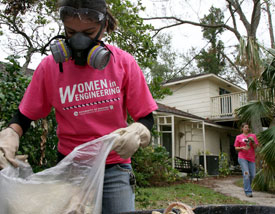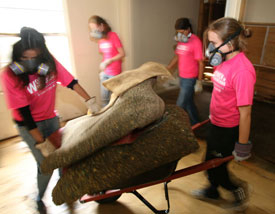BACLIFF — From a folding chair in her driveway, Treva Douglas watched students from the Cullen College's Women In Engineering organization gut the flood-ravaged property she’s called home for 30 years.
Just five days after the one-month anniversary of Hurricane Ike’s landfall, her mud soaked belongings and soggy carpet were finally being removed from her bay-front home. As hours passed piles grew, inundating the edges of Bayshore Drive.
For 61-year-old Douglas, who could not afford to pay contractors to restore her home, the sight of the engineering students was enough to bring her to tears.
“It’s unbelievable; I just don’t know the words to describe what they are doing,” said Douglas, her voice shaking. “I can’t thank them enough. These girls are like little angels running around.”
The volunteer effort brought nine women from the UH Cullen College of Engineering to Bacliff. It was among several service projects completed by the organization, promoting networking opportunities for women engineers on both a social and professional level, this year.
It was an opportunity WIE-UH Program Director Allison Swenson said offered students not only the chance to use their skills to help someone in need, but see the impact of their efforts in one afternoon.
“Hurricane Ike was very devastating to Houston and the surrounding areas, and people are still feeling the effects over a month later,” Swenson said. “I wanted the students from Women in Engineering-UH to volunteer for CORE and give back to the community. Volunteering for this cause not only takes the students away from campus and the stresses of class, but they can also use the problem solving skills that they are learning as engineering students to help someone in need.”
The UH organization teamed with CORE Alliance, a group formed three years ago by two Houston-based churches to aid in relief efforts following Hurricane Katrina. Today, CORE Alliance has grown to include more than 10 churches in the Greater Houston area. With the rehab of more than 500 Hurricane Katrina damaged homes behind them, CORE Alliance has moved on to aid after Ike—helping remove debris from close to 100 homes and gut another 80 flooded by surge waters that reached 14 feet in some areas.
“The dynamics are completely different; we are in our own backyard,” said Eric Cummings, director of operations for CORE Alliance of efforts now focused on Ike relief. “While the scope isn’t as big, the damage is still tremendous. We are grateful for the help of these volunteers.”
Stationed on the front porch of Douglas’ home Friday, Kara Smits, a junior mechanical engineering major, made room for anything salvageable still inside. As she arranged rocking chairs, yard ornaments, tables and bed frames, the 20-year-old reminisced.
“I had a family member go through something like this,” Smits said, recalling clean up efforts after Hurricane Rita in 2005 when high winds left debris strewn across her grandmother’s three-acre Beaumont property and power outages spoiled freezers of food. “It’s just important to give back,” she said.
Judy Rodriguez, a senior electrical engineering major, who aided neighbors in recovery following Tropical Storm Allison in 2001, sounded similar reasons for involvement.
“I didn’t have damage at my house,” she said, her voice low and muffled by the ventilator mask protecting her from mold that had begun to grow on furniture and boxes after weeks spent resting in surge water. “I had the time, so I wanted to help.”
Inside Douglas’ house, a brown line defined exactly how far the surge waters had reached—about two feet. Rushing water had brought tree limbs, leaves, mud, and even neighbors’ possessions into her home. Water damaged precious family portraits and molded equipment once housed in Douglas’ hair salon.
In the living room, the students’ feet squished on the still waterlogged carpet and crunched on the glass shards left behind by a large bay window once offering an unobstructed view of Galveston Bay. In one corner of the living space, sophomore mechanical engineering major Hoiyu Chan, was scooping layers of trinkets and debris from the floor with a shovel—plopping the loads into a wheelbarrow for sorting.
The 20-year-old, who normally works at a Sugarland ice cream shop on her Fridays without class, opted to ask off to join relief efforts. Chan said she was compelled to help by images plastered in newspapers and television broadcasts following the hurricane.
“It’s not even Galveston, and it’s terrible,” she said. “There’s water everywhere and mud, and the smell, it just gets right through your mask.”
For all helping Douglas Friday, life had been back to normal for weeks. Exposure to her situation offered the women a taste of what many near coastal areas were still dealing with now a month after the hurricane.
“I never really imagined something like this could happen, but now I know I was wrong,” said Carolina Andrade, a sophomore mechanical engineering major, who survived the inconvenience of just a week without power at her Katy home after Ike. “I’ve actually never done volunteering until today. Seeing this makes me appreciate what I have so much more. I’m glad I could come out and help.”
The women’s efforts Friday brought Douglas one-step closer to recovery and the chance to move out of her friend’s home. As she stood in front of the flood-damaged possessions pulled from her home, it was difficult for Douglas to hide her emotions.
“You just kind of shake your head and go—wow!” she said, picking up a few items for a closer look. “It is silly. It's just stuff and it shouldn’t make a difference, but it’s my stuff. It’s tough to see.”
Walking alongside UH volunteers as she finished surveying her losses, Douglas paused a moment and smiled at the pink-clad group, proudly displaying the saying “engineers rock” on their shirts.
“You girls are something else,” she said, starting to snicker. “Engineers rock, that’s right!”

